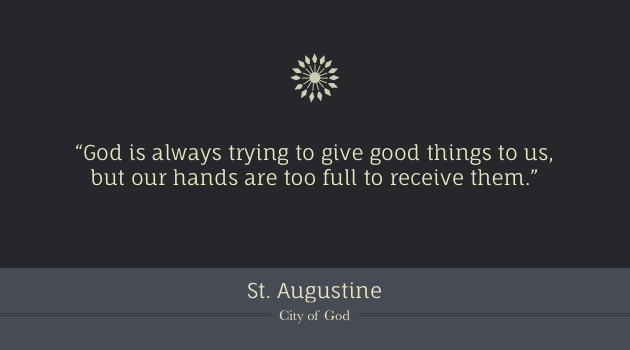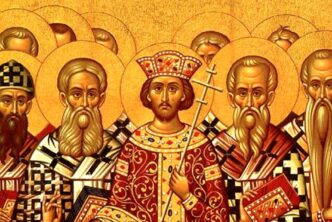 This month, you can get Saint Augustine: The City of God, Books I–VII for free plus two more volumes from the Fathers of the Church Series (127 vols.) for less than $5! Throughout June, we’re sharing excerpts from Saint Augustine: The City of God to give you a preview of the thoughtful and thought-provoking literary treatise you can expect from this month’s free book.
This month, you can get Saint Augustine: The City of God, Books I–VII for free plus two more volumes from the Fathers of the Church Series (127 vols.) for less than $5! Throughout June, we’re sharing excerpts from Saint Augustine: The City of God to give you a preview of the thoughtful and thought-provoking literary treatise you can expect from this month’s free book.
Today’s excerpt comes from The City of God by St. Augustine:
For he will render to every man according to his works. (Rom 2:6)
But, someone will say: ‘How, then, is it that this divine mercy was bestowed on impious and ungrateful man?’ Surely, the answer is that mercy was shown by the One who, day by day, ‘maketh His sun to rise upon the good and bad, and raineth upon the just and the unjust.’ For, although some who reflect on these truths repent and are converted from their wickedness, others, according to the words of the Apostle, despise ‘the riches of His goodness and long-suffering, in the hardness of their heart and impenitence’ and treasure up to themselves ‘wrath against the day of wrath and revelation of the just judgment of God Who will render to every man according to his works.’ Nevertheless, God’s patience is an invitation to the wicked to do penance, just as God’s scourge is a school of patience for the good. In like manner, God’s mercy embraces the good with love, just as His severity corrects the wicked with punishment. It has pleased Divine Providence to prepare for the just joys in the world to come in which the unjust will have no part; and for the impious, pains which will not afflict the virtuous. But, as for the paltry goods and evils of this transitory world, these He allotted alike to just and unjust, in order that men might not seek too eagerly after those goods which they see even the wicked to possess, or shrink too readily from those ills which commonly afflict the just.
However, there is a vast difference between the manner in which men use what we call prosperity and adversity. A good man is neither puffed up by fleeting success nor broken by adversity; whereas, a bad man is chastised by failure of this sort because he is corrupted by success. God often shows His intervention more clearly by the way He apportions the sweet and the bitter. For, if He visited every sin here below with manifest penalty, it might be thought that no score remained to be settled at the Last Judgment. On the other hand, if God did not plainly enough punish sin on earth, people might conclude that there is no such thing as Divine Providence. So, too, in regard to the good things of life. If God did not bestow them with patent liberality on some who ask Him, we could possibly argue that such things did not depend on His power. On the other hand, if He lavished them on all who asked, we might have the impression that God is to be served only for the gifts He bestows. In that case, the service of God would not make us religious, but rather covetous and greedy. In view of all that, when good and bad men suffer alike, they are not, for that reason indistinguishable because what they suffer is similar. The sufferers are different even though the sufferings are the same trials; though what they endure is the same, their virtue and vice are different.
For, in the same fire, gold gleams and straw smokes; under the same flail the stalk is crushed and the grain threshed; the lees are not mistaken for oil because they have issued from the same press. So, too, the tide of trouble will test, purify, and improve the good, but beat, crush, and wash away the wicked. So it is that, under the weight of the same affliction, the wicked deny and blaspheme God, and the good pray to Him and praise Him. The difference is not in what people suffer but in the way they suffer. The same shaking that makes fetid water stink makes perfume issue a more pleasant odor.
Augustine of Hippo. (1950). The City of God, Books I–VII. (H. Dressler, Ed., D. B. Zema & G. G. Walsh, Trans.) (Vol. 8, pp. 28–29). Washington, DC: The Catholic University of America Press.
***
Get the complete essay and more like it in Saint Augustine: The City of God, Books I–VII, free through June 30! And add The City of God, Books VIII–XVI and The City of God, Books XVII–XXII from the Fathers of the Church Series for less than $5.





